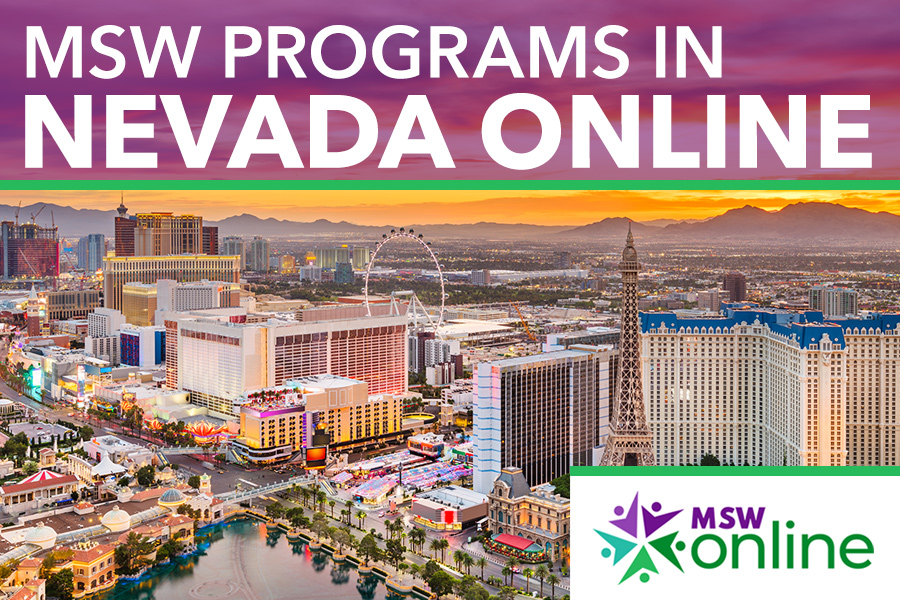MSW Programs in Nevada Online

Nevada’s dynamic social work education environment serves a diverse population concentrated in metropolitan hubs like Las Vegas and Reno while addressing the needs of rural communities across the Silver State. The University of Nevada, Reno’s social work department offers an online Master of Social Work (MSW) degree, providing in-state students with CSWE-accredited options that combine the rigor of traditional graduate education with the flexibility needed by working professionals. Students can also pursue nationally accredited online options that offer specialized concentrations and alternative scheduling formats to meet the growing demand for qualified social workers throughout the state’s varied geographic and demographic landscape.
Social work education in Nevada emphasizes practical application through robust fieldwork requirements, with MSW students completing at least 900 hours of fieldwork that often takes place in settings ranging from urban healthcare systems to community organizations serving diverse populations. The state’s licensure framework requires rigorous preparation, as Nevada statute requires that any person engaged as a social worker must be licensed, with clinical practitioners needing 3,000 hours of supervised social work experience, including at least 2,000 hours spent diagnosing and treating mental health conditions. This comprehensive approach to professional development ensures that Nevada’s MSW graduates are well-equipped to address the complex social issues facing the state’s communities, from substance abuse and mental health challenges in tourist-heavy areas to family services and healthcare access in more remote regions. The combination of Nevada’s tourism-based economy and growing population creates unique career opportunities for social workers who can navigate both urban social services and rural community needs, making advanced education through quality MSW programs essential for those seeking to make a meaningful impact in the state’s evolving social work landscape.
2026 Best Nevada MSW Programs Online
University of Nevada-Reno
Reno, NV - Public 4-Year - unr.edu
Master's - Master of Social Work Traditional
Online Learning - Visit Website
The University of Nevada-Reno offers an online Master of Social Work program focused on advanced generalist practice, equipping students for diverse social work roles. This program does not require an entrance exam such as the GRE, and it is delivered entirely online for flexibility. Applicants need a bachelor's degree with a minimum 2.75 GPA, completion of statistics and research methods courses, a $60 fee, essays, two recommendations, and a resume. Applications are accepted year-round with deadlines for fall (July 27), spring (December 1), and summer (April 6) starts, making it accessible for various schedules.
- Online program format
- Advanced generalist practice focus
- Bachelor's degree required
- Minimum GPA of 2.75
- Statistics course needed
- Research methods course needed
- $60 application fee
- Essays required
- Two letters of recommendation
- Resume submission needed
List of Nevada Online MSW Programs
List of Nevada Advanced Standing Online MSW Programs
Advanced standing MSW programs in Nevada provide an intensive degree pathway for students with a Bachelor of Social Work (BSW) from a CSWE-accredited program, allowing them to advance their professional education through an accelerated master’s curriculum. These programs emphasize addiction and recovery services, multicultural practice competencies, and desert community outreach to address the unique social challenges of Nevada’s urban gaming centers, rural mining towns, and rapidly growing suburban populations.
Reno, NV
University of Nevada-Reno
- Master's - Master of Social Work
Concentration: Advanced Generalist Practice - Online Learning - Website
- Online Master of Social Work
- Advanced Generalist Practice concentration
- Year-round applications accepted
- Bachelor's degree required for admission
- Specific prerequisites for non-social work degrees
- Versatile career preparation
- Focus on diverse social work challenges
- Financial details available online
2026 Affordable Online Nevada Advanced Standing MSW Programs
| University of Nevada-Reno |
|
|
